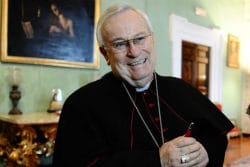
May 25, 2017 | Focolare Worldwide, Senza categoria
 Maria Voce says that it was “with great pleasure” that she learnt of Cardinal Gualtiero Bassetti’s appointment as new President of the Italian Episcopal Conference (CEI) on May 24, 2017. In a letter congratulating him, the President of the Focolare Movement expresses her “most sincere wishes for this prestigious assignment, a clear sign of trust on behalf of the Holy Father.” “His sense of collegiality and love, which are his trademarks,” continues the President, “will be a great gift for the entire ecclesial and civil community of Italy, especially for those who most resemble Jesus Crucified and Abandoned “. The Focolare Movement in Italy also congratulated the new President of the Bishops’ Conference, saying his appointment is “a source of great joy”. In a press release, it emphasizes his “particular style in always being close to the people, to workers, migrants, families, in their situations of crisis and in their search for truth.” The Movement wishes that he may “experience in this new task an ever-renewed courage to face the countless challenges, comforted by the collegiality which is a witness to the fraternal aspect of the Church.” Born in 1942 in Marradi near Florence, Gualtiero Bassetti was ordained a priest in 1966. In 1994 he was appointed Bishop of Massa Marittima, then Bishop of Arezzo (1998) and in 2009 Archbishop of Perugia. In 2014, Pope Francis welcomed him into the College of Cardinals.
Maria Voce says that it was “with great pleasure” that she learnt of Cardinal Gualtiero Bassetti’s appointment as new President of the Italian Episcopal Conference (CEI) on May 24, 2017. In a letter congratulating him, the President of the Focolare Movement expresses her “most sincere wishes for this prestigious assignment, a clear sign of trust on behalf of the Holy Father.” “His sense of collegiality and love, which are his trademarks,” continues the President, “will be a great gift for the entire ecclesial and civil community of Italy, especially for those who most resemble Jesus Crucified and Abandoned “. The Focolare Movement in Italy also congratulated the new President of the Bishops’ Conference, saying his appointment is “a source of great joy”. In a press release, it emphasizes his “particular style in always being close to the people, to workers, migrants, families, in their situations of crisis and in their search for truth.” The Movement wishes that he may “experience in this new task an ever-renewed courage to face the countless challenges, comforted by the collegiality which is a witness to the fraternal aspect of the Church.” Born in 1942 in Marradi near Florence, Gualtiero Bassetti was ordained a priest in 1966. In 1994 he was appointed Bishop of Massa Marittima, then Bishop of Arezzo (1998) and in 2009 Archbishop of Perugia. In 2014, Pope Francis welcomed him into the College of Cardinals.
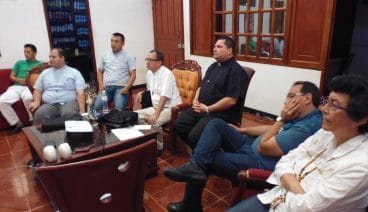
May 25, 2017 | Focolare Worldwide
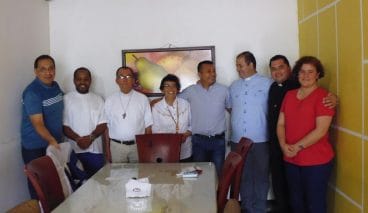 Elizabeth and Allejandra from the women’s focolare in Bogota write: “We went to Mocoa with Fr Juan Carlos Almario, a priest and a focolarino, to take monies to them that had been collected by the Focolare community of Colombia. We were there in the name of the entire Focolare family, to take them their love, prayers and concrete assistance, not only from the community in Colombia but also from many parts of the world that had become involved in this tragedy.” “Several priests from the Movement – pastors from Mocoa – welcomed us with much joy. Then we met the people. Every one of them had a painful story to tell us that was linked to the catastrophe, and we wept with them.” They recalled that April 1st night, the mudslides and the “love race” that broke out among them in reaching the victims. The priests and their bishop, Luis Maldonado, along with other parish priests, got organized to stand by the wounded in the hospitals, to welcome families in search of loved ones and to bury their dead… Then, with the help of other parishioners they set up a canteen to provide meals for people who were without water and electricity, and to share with the public workers that were involved in the relief effort. They arranged the assistance materials as they arrived, so that they could be distributed to those in need, along with surgical masks to protect from the overpowering odours. “The recount of their efforts had a strong Marian quality, silent but concrete, that reached the people through them and met many of the needs that resulted from the tragedy.”
Elizabeth and Allejandra from the women’s focolare in Bogota write: “We went to Mocoa with Fr Juan Carlos Almario, a priest and a focolarino, to take monies to them that had been collected by the Focolare community of Colombia. We were there in the name of the entire Focolare family, to take them their love, prayers and concrete assistance, not only from the community in Colombia but also from many parts of the world that had become involved in this tragedy.” “Several priests from the Movement – pastors from Mocoa – welcomed us with much joy. Then we met the people. Every one of them had a painful story to tell us that was linked to the catastrophe, and we wept with them.” They recalled that April 1st night, the mudslides and the “love race” that broke out among them in reaching the victims. The priests and their bishop, Luis Maldonado, along with other parish priests, got organized to stand by the wounded in the hospitals, to welcome families in search of loved ones and to bury their dead… Then, with the help of other parishioners they set up a canteen to provide meals for people who were without water and electricity, and to share with the public workers that were involved in the relief effort. They arranged the assistance materials as they arrived, so that they could be distributed to those in need, along with surgical masks to protect from the overpowering odours. “The recount of their efforts had a strong Marian quality, silent but concrete, that reached the people through them and met many of the needs that resulted from the tragedy.”  “We wanted to keep in our hearts the topic that the entire Movement is focusing on this year, and it seemed so in tune with the situation we found ourselves in: Jesus Forsaken.” In the spontaneous communion that was born, each one of us sought to see the suffering that was being experienced, seeing in it a face of the infinite suffering Jesus experienced on the Cross, which gives meaning to so much suffering.” One of the priests said, during lunch, that those hours spent with each other were like an “oases” that managed to detach him from the nightmare. “Then, together with Fr Oscar, we travelled around the places that were hit by the mudslides, some quarters completely wiped out. Others had been turned into cemeteries with houses demolished by huge boulders, with uprooted trees everywhere. The love, prayers and assistance reached all the way to Mocoa as it goes through this living hell, and it helped to uplift the victims of this tragedy somewhat. The trip also included a visit to the city of Neiva in southern Colombia: “We wanted to visit our local Focolare community and, with them, to prepare for the upcoming Mariapolis that will be held in July at an archaeological park where there are intact remains of some of the most ancient indigenous cultures.” Amidst the pain and suffering of natural distaster, the Focolare in Colombia is focused on the future. See also:News from Colombia
“We wanted to keep in our hearts the topic that the entire Movement is focusing on this year, and it seemed so in tune with the situation we found ourselves in: Jesus Forsaken.” In the spontaneous communion that was born, each one of us sought to see the suffering that was being experienced, seeing in it a face of the infinite suffering Jesus experienced on the Cross, which gives meaning to so much suffering.” One of the priests said, during lunch, that those hours spent with each other were like an “oases” that managed to detach him from the nightmare. “Then, together with Fr Oscar, we travelled around the places that were hit by the mudslides, some quarters completely wiped out. Others had been turned into cemeteries with houses demolished by huge boulders, with uprooted trees everywhere. The love, prayers and assistance reached all the way to Mocoa as it goes through this living hell, and it helped to uplift the victims of this tragedy somewhat. The trip also included a visit to the city of Neiva in southern Colombia: “We wanted to visit our local Focolare community and, with them, to prepare for the upcoming Mariapolis that will be held in July at an archaeological park where there are intact remains of some of the most ancient indigenous cultures.” Amidst the pain and suffering of natural distaster, the Focolare in Colombia is focused on the future. See also:News from Colombia
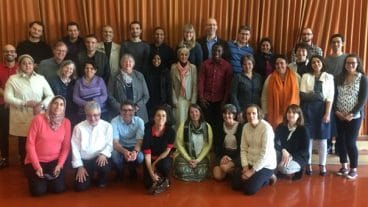
May 24, 2017 | Focolare Worldwide
 «What lies in our heart? Towards what is it oriented? How can we learn to know it better? Aren’t the paths of the heart like roller coasters?» These are some of the issues which stimulated the dialogue between Christians and Muslims participating in a meeting and were visible signs of the desire of both groups to share. The meeting was held at the Muslim cultural center at the end of April and ended in the evangelic parish. It started with the theological reflections of the evangelical pastor, Martin Hoegger, and the Imam, Djalel Meskaldji. Both considered how the Bible and the Koran amplify the meaning of the word “heart,” not only as the seat of sentiments, but rather as the center of our being, and that space where we find dialogue with our own selves, with the others and with God. «The most common disease is not the flu, but schlerosis, that is, the hardening of the heart», M. Hoegger ironically said. And Djalel Meskaldji added: «According to the Koran, the heart can be even harder than stones. It is covered with rust.» They underlined in fact, that the heart is the most precious thing we have, but experience tells us that often it can harden. This leads to the consideration that the “custody of the heart” is a frequent theme in the Bible and in the Fathers of the Church, theologians of the first centuries. And so, to keep a strong hold on one’s heart is a real “spiritual battle.” This would be, according to Meskaldji, the real meaning of the word “Jihad,” according to Muslim tradition. Pastor Hoegger recalled that the biblical prophets «announced that God will one day chisel his law of love in our hearts and put in us a new heart, a heart of flesh.» Furthermore: «Christians turn to Jesus in whom this promise was fulfilled.» On his part, the Imam stressed that: «the Koran repeatedly affirms that the heart needs to be purified by the limpid water of the word of God. It wakens my heart, nurtures it, breaks its toughness and cleans it of the rust that is mostly the outcome of pride.» From Algiers, in live streaming Sheherazad and Farouk, Muslims, recounted how the discovery of God who is love, through the spirituality of the Focolare Movement, has revolutionised their lives as a couple: «We have learned how to love the other for himself, and let God act in the heart of each one so as to be a living witness of the unity of God. But above all, we experience God’s grace which encloses our heart with his mercy.» Then, Anne Catherine Reymond and Fabien, Christians of the Sant’Egidio Community, shared their pathway, narrating how the presence of God has transformed their hearts through prayer and fraternal life, and also through their contact with the poor. «Faith in God is a compass in the challenges which a couple has to face, especially in the education of their children. They push us to place ourselves on a second plane so as to put God in the first place.» What came to light in the group dialogues was what Christians and Muslims have in common. A Muslim woman from Lyon concluded: «In an era in which many try to divide our communities, it is very important to gather together in an atmosphere of mutual esteem!» In this joyful day the participants unanimously expressed the desire to continue the dialogue, also through new encounters.
«What lies in our heart? Towards what is it oriented? How can we learn to know it better? Aren’t the paths of the heart like roller coasters?» These are some of the issues which stimulated the dialogue between Christians and Muslims participating in a meeting and were visible signs of the desire of both groups to share. The meeting was held at the Muslim cultural center at the end of April and ended in the evangelic parish. It started with the theological reflections of the evangelical pastor, Martin Hoegger, and the Imam, Djalel Meskaldji. Both considered how the Bible and the Koran amplify the meaning of the word “heart,” not only as the seat of sentiments, but rather as the center of our being, and that space where we find dialogue with our own selves, with the others and with God. «The most common disease is not the flu, but schlerosis, that is, the hardening of the heart», M. Hoegger ironically said. And Djalel Meskaldji added: «According to the Koran, the heart can be even harder than stones. It is covered with rust.» They underlined in fact, that the heart is the most precious thing we have, but experience tells us that often it can harden. This leads to the consideration that the “custody of the heart” is a frequent theme in the Bible and in the Fathers of the Church, theologians of the first centuries. And so, to keep a strong hold on one’s heart is a real “spiritual battle.” This would be, according to Meskaldji, the real meaning of the word “Jihad,” according to Muslim tradition. Pastor Hoegger recalled that the biblical prophets «announced that God will one day chisel his law of love in our hearts and put in us a new heart, a heart of flesh.» Furthermore: «Christians turn to Jesus in whom this promise was fulfilled.» On his part, the Imam stressed that: «the Koran repeatedly affirms that the heart needs to be purified by the limpid water of the word of God. It wakens my heart, nurtures it, breaks its toughness and cleans it of the rust that is mostly the outcome of pride.» From Algiers, in live streaming Sheherazad and Farouk, Muslims, recounted how the discovery of God who is love, through the spirituality of the Focolare Movement, has revolutionised their lives as a couple: «We have learned how to love the other for himself, and let God act in the heart of each one so as to be a living witness of the unity of God. But above all, we experience God’s grace which encloses our heart with his mercy.» Then, Anne Catherine Reymond and Fabien, Christians of the Sant’Egidio Community, shared their pathway, narrating how the presence of God has transformed their hearts through prayer and fraternal life, and also through their contact with the poor. «Faith in God is a compass in the challenges which a couple has to face, especially in the education of their children. They push us to place ourselves on a second plane so as to put God in the first place.» What came to light in the group dialogues was what Christians and Muslims have in common. A Muslim woman from Lyon concluded: «In an era in which many try to divide our communities, it is very important to gather together in an atmosphere of mutual esteem!» In this joyful day the participants unanimously expressed the desire to continue the dialogue, also through new encounters.
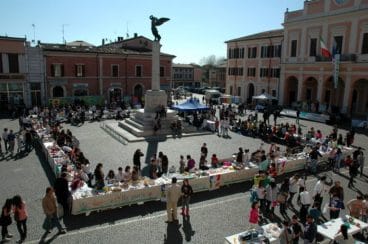
May 19, 2017 | Focolare Worldwide
 “We asked the mayor of Savignano sul Rubicone to send a message of fraternity by adding some color to a public space,” say Matteo and Giosuè, Italian members of Youth for a United World. “They gave us an underpass connecting the main road to the train station. We created a mural where we wrote, next to the bridge that symbolizes the city, ‘Let’s bridge’ and “Global citizens” in a number of languages, with the help of a number of migrant kids who came through.” The result was a collective work, a visible sign of peace. The mural project was also an opportunity to make contact with the head of the Ravenna mosque, Imam Mustapha Soufi (president of the European Islamic Conference of Imams). After three months of work the underpass was inaugurated with two mayors and a member of European Parliament who, just three days after the terrible events in Brussels (this was March 2016), had asked to participate in this type of project, one promoted by kids that instils hope in a peaceful future. The underpass became a symbolic place. Matteo and Giosuè are both “ambassadors of peace,” an honorary title bestowed on them by Universal Circle of Ambassadors of Peace, headquartered in Geneva, which has the goal of spotlighting all those who work for peace, especially young people and children ages 6 to 18. For a number of years, they have organized a spring fair in their region, together with other young people. This is a Young for Unity project that, in collaboration with schools, associations and local governments, hopes to create activities promoting peace and fraternity. “Last July,” continues Matteo, “together with 50 members of Young for Unity, we went to World Youth Day. Pope Francis concluded his words with ‘May God bless your dreams.’ There are so many dreams that we want to achieve, especially to be builders of a world of peace and fraternity.” After an earthquake struck central Italy, they felt called once again. Among the many ideas was one to put on two dinners in Modena and Cesena to raise funds. “We got close to 100 kids involved and served 350 people at table, raising more than 4,000 Euros.” The dinner at Cesena included Imam Mustapha, who asked them to come and meet young Muslims to start on a path for peace at the Ravenna mosque, one of the four official mosques in Italy. They were warmly welcomed on January 22. They took off their shoes as they entered, and the girls covered their heads. They sat in a circle, girls to one side, boys to the other. “We started playing a quiz game on the Bible and Quran – there are so many things in common. We are not so different, and all of us wanted to build a more united world. At noon we stood up and, holding hands, we had a minute of silence to ask God for the gift of peace.” After a meal of cous cous prepared by the Muslim mothers, the group had a guided tour of the mosque and a moment of dialogue. “Peace is made by the young,” says the imam, “we must unite and change our way of thinking in order to bring down the walls of prejudice.” Their Muslim friends asked to be able to visit a Catholic church next. “It feels fantastic,” concludes Giosuè. “To build peace we need to respect each other and not be afraid of differences. How can we not think of those Muslim kids that we meet at school or perhaps come across on the street? They too are our brothers, builders of peace together with us, and not terrorists like the media wants us to believe.”
“We asked the mayor of Savignano sul Rubicone to send a message of fraternity by adding some color to a public space,” say Matteo and Giosuè, Italian members of Youth for a United World. “They gave us an underpass connecting the main road to the train station. We created a mural where we wrote, next to the bridge that symbolizes the city, ‘Let’s bridge’ and “Global citizens” in a number of languages, with the help of a number of migrant kids who came through.” The result was a collective work, a visible sign of peace. The mural project was also an opportunity to make contact with the head of the Ravenna mosque, Imam Mustapha Soufi (president of the European Islamic Conference of Imams). After three months of work the underpass was inaugurated with two mayors and a member of European Parliament who, just three days after the terrible events in Brussels (this was March 2016), had asked to participate in this type of project, one promoted by kids that instils hope in a peaceful future. The underpass became a symbolic place. Matteo and Giosuè are both “ambassadors of peace,” an honorary title bestowed on them by Universal Circle of Ambassadors of Peace, headquartered in Geneva, which has the goal of spotlighting all those who work for peace, especially young people and children ages 6 to 18. For a number of years, they have organized a spring fair in their region, together with other young people. This is a Young for Unity project that, in collaboration with schools, associations and local governments, hopes to create activities promoting peace and fraternity. “Last July,” continues Matteo, “together with 50 members of Young for Unity, we went to World Youth Day. Pope Francis concluded his words with ‘May God bless your dreams.’ There are so many dreams that we want to achieve, especially to be builders of a world of peace and fraternity.” After an earthquake struck central Italy, they felt called once again. Among the many ideas was one to put on two dinners in Modena and Cesena to raise funds. “We got close to 100 kids involved and served 350 people at table, raising more than 4,000 Euros.” The dinner at Cesena included Imam Mustapha, who asked them to come and meet young Muslims to start on a path for peace at the Ravenna mosque, one of the four official mosques in Italy. They were warmly welcomed on January 22. They took off their shoes as they entered, and the girls covered their heads. They sat in a circle, girls to one side, boys to the other. “We started playing a quiz game on the Bible and Quran – there are so many things in common. We are not so different, and all of us wanted to build a more united world. At noon we stood up and, holding hands, we had a minute of silence to ask God for the gift of peace.” After a meal of cous cous prepared by the Muslim mothers, the group had a guided tour of the mosque and a moment of dialogue. “Peace is made by the young,” says the imam, “we must unite and change our way of thinking in order to bring down the walls of prejudice.” Their Muslim friends asked to be able to visit a Catholic church next. “It feels fantastic,” concludes Giosuè. “To build peace we need to respect each other and not be afraid of differences. How can we not think of those Muslim kids that we meet at school or perhaps come across on the street? They too are our brothers, builders of peace together with us, and not terrorists like the media wants us to believe.”

May 11, 2017 | Focolare Worldwide
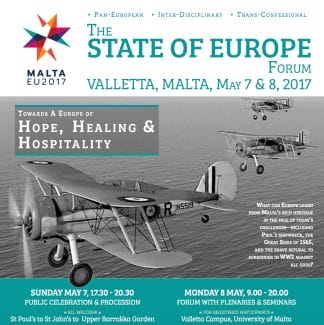 Malta is the largest island in the archipelago that shares its name. It is located in the central Mediterranean Sea between Sicily, Tunisia and Libya. It was the head of the Council of the European Union for the first time in its history in 2017. The island, whose symbol is the eight-cusped cross, signifying the eight Beatitudes, pertaining to the Knights of Malta, is closely situated to the tragedies that occur daily in the blue tomb that the Mediterranean Sea has become for those crossing between Africa, the Middle East and Europe in a desperate search for a new chance at life. On one of its other shores another shipwreck had found safe port after fourteen days adrift. One of the passengers was Saint Paul on his way back to Rome in around AD 60. According to tradition the ship carrying him and another 264 passengers was sunk by a storm, and everyone on board swam to shore. After some time he was invited to stay at the house of Publius, the Roman governor of the islands, whose father Paul cured of a serious flu. The governor converted to Christianity and became the first bishop of Malta. Europe’s Christian roots were the focus of discussion in Malta’s capital of Valletta on the 7th and 8th of May during a forum titled Towards a Europe of Hope, Healing and Hospitality. The goal of the forum, which is held each year by the European Union in the country of the presidency, is the promotion of dialogue according to the foundational inspiration of Robert Schuman. On the first day, after the opening events at the Anglican Cathedral, there was an artistic performance and a prayer titled “Hope”. Then a procession led through the streets of Valletta to the Roman Catholic Co-Cathedral of Saint John where some words were offered by Archbishop Scicluna and Maria Voce. The Focolare president offered a reflection on “Healing and Reconciliation”.
Malta is the largest island in the archipelago that shares its name. It is located in the central Mediterranean Sea between Sicily, Tunisia and Libya. It was the head of the Council of the European Union for the first time in its history in 2017. The island, whose symbol is the eight-cusped cross, signifying the eight Beatitudes, pertaining to the Knights of Malta, is closely situated to the tragedies that occur daily in the blue tomb that the Mediterranean Sea has become for those crossing between Africa, the Middle East and Europe in a desperate search for a new chance at life. On one of its other shores another shipwreck had found safe port after fourteen days adrift. One of the passengers was Saint Paul on his way back to Rome in around AD 60. According to tradition the ship carrying him and another 264 passengers was sunk by a storm, and everyone on board swam to shore. After some time he was invited to stay at the house of Publius, the Roman governor of the islands, whose father Paul cured of a serious flu. The governor converted to Christianity and became the first bishop of Malta. Europe’s Christian roots were the focus of discussion in Malta’s capital of Valletta on the 7th and 8th of May during a forum titled Towards a Europe of Hope, Healing and Hospitality. The goal of the forum, which is held each year by the European Union in the country of the presidency, is the promotion of dialogue according to the foundational inspiration of Robert Schuman. On the first day, after the opening events at the Anglican Cathedral, there was an artistic performance and a prayer titled “Hope”. Then a procession led through the streets of Valletta to the Roman Catholic Co-Cathedral of Saint John where some words were offered by Archbishop Scicluna and Maria Voce. The Focolare president offered a reflection on “Healing and Reconciliation”. 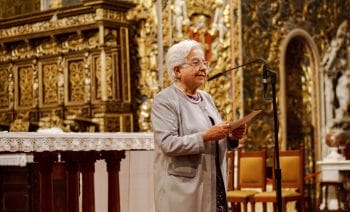 On the anniversary of that “community of peoples” that Schuman envisioned in 1950, proposing the historic coal and steel community to avoid all forms of war between France, Germany and any country who would later join the community, Maria Voce asked what the inspirational spark might have been behind such an extraordinary gesture that was intended to bring reconciliation to populations overwhelmed by the most horrible conflicts ever seen up until then. Who had inspired Schuman, Adenauer, De Gasperi – all Christian statesmen who are considered the founding fathers of Europe? The answer is obvious: “We want to think that the ideas and the strength to build Europe came from God who had shown his love for all people by suffering an infamous and atrocious death, God had identified with all the pains of humanity, including the ones deriving from violence and wars.”
On the anniversary of that “community of peoples” that Schuman envisioned in 1950, proposing the historic coal and steel community to avoid all forms of war between France, Germany and any country who would later join the community, Maria Voce asked what the inspirational spark might have been behind such an extraordinary gesture that was intended to bring reconciliation to populations overwhelmed by the most horrible conflicts ever seen up until then. Who had inspired Schuman, Adenauer, De Gasperi – all Christian statesmen who are considered the founding fathers of Europe? The answer is obvious: “We want to think that the ideas and the strength to build Europe came from God who had shown his love for all people by suffering an infamous and atrocious death, God had identified with all the pains of humanity, including the ones deriving from violence and wars.”  With regard to the culture that could emerge when there is profound reconciliation, Maria Voce quoted Chiara Lubich: “Every person can have a contribution to give – in any field: science, art, politics, communications, and so on. And they will be more efficacious if they work together with others who are united in the name of Christ: it is the continuation of the Incarnation and, it is in this way, that what could be called a culture of the Resurrection spreads through the world.” But for this to happen, “a path towards full and visible communion is asked of us, Christians, knowing that this will be decisive for the unity of Europe and for serving humanity better.” Recently, this path began to unfold further stages, in Lund, Sweden, Lesbos, Greece, and Cuba. “In a multi-cultural and multi-religious Europe there is need for a new capacity to dialogue, dialogue that can be based on the Golden Rule that is found in every religion on earth.” How significant to be saying these things precisely in the safe port of Malta in the midst of the Mediterranean, in the hope that this blue tomb will again become “Mare Nostrum” where Europe, Africa and the Middle East can find a peaceful route.
With regard to the culture that could emerge when there is profound reconciliation, Maria Voce quoted Chiara Lubich: “Every person can have a contribution to give – in any field: science, art, politics, communications, and so on. And they will be more efficacious if they work together with others who are united in the name of Christ: it is the continuation of the Incarnation and, it is in this way, that what could be called a culture of the Resurrection spreads through the world.” But for this to happen, “a path towards full and visible communion is asked of us, Christians, knowing that this will be decisive for the unity of Europe and for serving humanity better.” Recently, this path began to unfold further stages, in Lund, Sweden, Lesbos, Greece, and Cuba. “In a multi-cultural and multi-religious Europe there is need for a new capacity to dialogue, dialogue that can be based on the Golden Rule that is found in every religion on earth.” How significant to be saying these things precisely in the safe port of Malta in the midst of the Mediterranean, in the hope that this blue tomb will again become “Mare Nostrum” where Europe, Africa and the Middle East can find a peaceful route.

May 9, 2017 | Focolare Worldwide
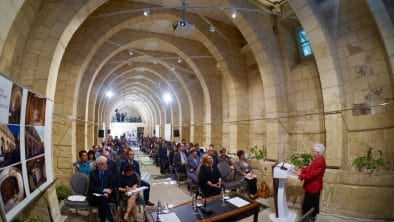 The visit (2-7 May) began with the participation on Monday, 2nd May, in the seminar promoted by “Communion and Law,” entitled, “Law as a means for integration in a multicultural society,” held in a meeting hall at the Presidential Palace, together with around 70 experts in the fields of immigration, education and employment. Among them were representatives of the Maltese Commission for refugees, representatives of the IOM and EASO Malta, Arnold Cassola, President of the Alternative Democratic Party (Alternattiva Demokratika), as well as law teachers and students. In her speech Maria Voce affirmed that the law can became an instrument for integration in society “if we overcome an exclusively formal vision, and focus on the concept of Law as an indispensable means for contributing to the creation of a reality of communion in society.” Citing the Together for Europe experience, born from an inspiration of Chiara Lubich, she talked about the actions that “appear like a prophetic sign of what Europe can become if its citizens will share more, the common experience that goes beyond the different cultures and ecclesiastical faiths,” and thus be a voice of “a Europe which, based on its own roots, opens out without fear to those who ask to be accepted and knows that the blend of peoples that have composed it for centuries can in turn blend with other peoples that will contribute to its development.” Each speech was backed by concrete initiatives, like the TANDEM project – presented by Apollos Pedro from Biafra, but a resident in Italy – which promotes peace and dialogue, giving people of different nationalities and religions the chance to live together.
The visit (2-7 May) began with the participation on Monday, 2nd May, in the seminar promoted by “Communion and Law,” entitled, “Law as a means for integration in a multicultural society,” held in a meeting hall at the Presidential Palace, together with around 70 experts in the fields of immigration, education and employment. Among them were representatives of the Maltese Commission for refugees, representatives of the IOM and EASO Malta, Arnold Cassola, President of the Alternative Democratic Party (Alternattiva Demokratika), as well as law teachers and students. In her speech Maria Voce affirmed that the law can became an instrument for integration in society “if we overcome an exclusively formal vision, and focus on the concept of Law as an indispensable means for contributing to the creation of a reality of communion in society.” Citing the Together for Europe experience, born from an inspiration of Chiara Lubich, she talked about the actions that “appear like a prophetic sign of what Europe can become if its citizens will share more, the common experience that goes beyond the different cultures and ecclesiastical faiths,” and thus be a voice of “a Europe which, based on its own roots, opens out without fear to those who ask to be accepted and knows that the blend of peoples that have composed it for centuries can in turn blend with other peoples that will contribute to its development.” Each speech was backed by concrete initiatives, like the TANDEM project – presented by Apollos Pedro from Biafra, but a resident in Italy – which promotes peace and dialogue, giving people of different nationalities and religions the chance to live together.  On 4th May, Maria Voce met with the President of the Republic of Malta, Marie-Louise Coleiro Preca, to whom she recounted the various branches of the Focolare Movement in Malta, and in particular the activities of New Humanity and the initiatives of the teenagers and young people. The President showed great interest and in the end, greeted the youth with a warm embrace. “The Focolare is like a vitamin boost. The art of loving is a precursor to positive peace in a world that is increasingly narcissistic and egocentric.” The children then presented her with the “Dice of love”. The Focolare President had been invited by the Malta Diocese, through its Ecumenical Commission, on the occasion of the 40th anniversary of its foundation. In this context, on 5th May, Maria Voce was received by the Archbishop C.J. Scicluna. Immediately afterwards, in the presence of 300 participants, she gave a conference on the topic “Dialogue or Dialogues – A Way of Life”.
On 4th May, Maria Voce met with the President of the Republic of Malta, Marie-Louise Coleiro Preca, to whom she recounted the various branches of the Focolare Movement in Malta, and in particular the activities of New Humanity and the initiatives of the teenagers and young people. The President showed great interest and in the end, greeted the youth with a warm embrace. “The Focolare is like a vitamin boost. The art of loving is a precursor to positive peace in a world that is increasingly narcissistic and egocentric.” The children then presented her with the “Dice of love”. The Focolare President had been invited by the Malta Diocese, through its Ecumenical Commission, on the occasion of the 40th anniversary of its foundation. In this context, on 5th May, Maria Voce was received by the Archbishop C.J. Scicluna. Immediately afterwards, in the presence of 300 participants, she gave a conference on the topic “Dialogue or Dialogues – A Way of Life”.  Also present were the Archbishop, the President of the Ecumenical Commission, the Vicar General, the Secretary of the Nunciature of Malta, the Nuncio of the Ivory Coast (of Maltese origin), a representative of the Romanian Orthodox Church, two members of the “Robert Schuman Centre for European Studies” and several members of ecclesial organisations. In tracing the rich history of the Movement’s ecumenical commitment, Maria Voce explained that the method of dialogue which Chiara Lubich promoted is love, “a dialogue between people, not between ideologies of systems of thought. She said that this must necessarily be supported and substantiated by mercy, compassion, and charity, summarised in the Golden Rule present in every culture and religion: Do to others whatever you wish others to do to you (Mt 7:12).” “The only way to ease the way to unity in truth is that of bowing before the others in the attitude of washing their feet (cf Jn 13) instead of telling them off. We need a lot of patience and humbleness.” Lastly, she presented the Ottmaring Declaration, published in Germany last 21 February, in which the Focolare Movement undertakes a greater ecumenical commitment. In the end, the Archbishop thanked Maria Voce for the work of the Focolare Movement in “arousing in people the thirst for unity.” He also recalled a phrase of Paul VI: “the world listens more to witnesses than to teachers.” Read about the Focolare in Malta
Also present were the Archbishop, the President of the Ecumenical Commission, the Vicar General, the Secretary of the Nunciature of Malta, the Nuncio of the Ivory Coast (of Maltese origin), a representative of the Romanian Orthodox Church, two members of the “Robert Schuman Centre for European Studies” and several members of ecclesial organisations. In tracing the rich history of the Movement’s ecumenical commitment, Maria Voce explained that the method of dialogue which Chiara Lubich promoted is love, “a dialogue between people, not between ideologies of systems of thought. She said that this must necessarily be supported and substantiated by mercy, compassion, and charity, summarised in the Golden Rule present in every culture and religion: Do to others whatever you wish others to do to you (Mt 7:12).” “The only way to ease the way to unity in truth is that of bowing before the others in the attitude of washing their feet (cf Jn 13) instead of telling them off. We need a lot of patience and humbleness.” Lastly, she presented the Ottmaring Declaration, published in Germany last 21 February, in which the Focolare Movement undertakes a greater ecumenical commitment. In the end, the Archbishop thanked Maria Voce for the work of the Focolare Movement in “arousing in people the thirst for unity.” He also recalled a phrase of Paul VI: “the world listens more to witnesses than to teachers.” Read about the Focolare in Malta

 Maria Voce says that it was “with great pleasure” that she learnt of Cardinal Gualtiero Bassetti’s appointment as new President of the Italian Episcopal Conference (CEI) on May 24, 2017. In a letter congratulating him, the President of the Focolare Movement expresses her “most sincere wishes for this prestigious assignment, a clear sign of trust on behalf of the Holy Father.” “His sense of collegiality and love, which are his trademarks,” continues the President, “will be a great gift for the entire ecclesial and civil community of Italy, especially for those who most resemble Jesus Crucified and Abandoned “. The Focolare Movement in Italy also congratulated the new President of the Bishops’ Conference, saying his appointment is “a source of great joy”. In a press release, it emphasizes his “particular style in always being close to the people, to workers, migrants, families, in their situations of crisis and in their search for truth.” The Movement wishes that he may “experience in this new task an ever-renewed courage to face the countless challenges, comforted by the collegiality which is a witness to the fraternal aspect of the Church.” Born in 1942 in Marradi near Florence, Gualtiero Bassetti was ordained a priest in 1966. In 1994 he was appointed Bishop of Massa Marittima, then Bishop of Arezzo (1998) and in 2009 Archbishop of Perugia. In 2014, Pope Francis welcomed him into the College of Cardinals.
Maria Voce says that it was “with great pleasure” that she learnt of Cardinal Gualtiero Bassetti’s appointment as new President of the Italian Episcopal Conference (CEI) on May 24, 2017. In a letter congratulating him, the President of the Focolare Movement expresses her “most sincere wishes for this prestigious assignment, a clear sign of trust on behalf of the Holy Father.” “His sense of collegiality and love, which are his trademarks,” continues the President, “will be a great gift for the entire ecclesial and civil community of Italy, especially for those who most resemble Jesus Crucified and Abandoned “. The Focolare Movement in Italy also congratulated the new President of the Bishops’ Conference, saying his appointment is “a source of great joy”. In a press release, it emphasizes his “particular style in always being close to the people, to workers, migrants, families, in their situations of crisis and in their search for truth.” The Movement wishes that he may “experience in this new task an ever-renewed courage to face the countless challenges, comforted by the collegiality which is a witness to the fraternal aspect of the Church.” Born in 1942 in Marradi near Florence, Gualtiero Bassetti was ordained a priest in 1966. In 1994 he was appointed Bishop of Massa Marittima, then Bishop of Arezzo (1998) and in 2009 Archbishop of Perugia. In 2014, Pope Francis welcomed him into the College of Cardinals.









 On 4th May, Maria Voce met with the President of the Republic of Malta,
On 4th May, Maria Voce met with the President of the Republic of Malta,